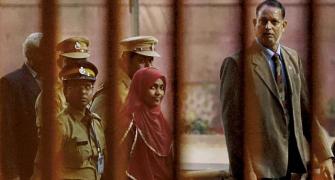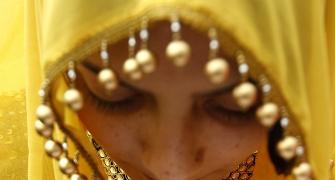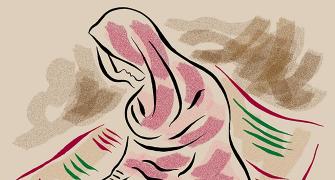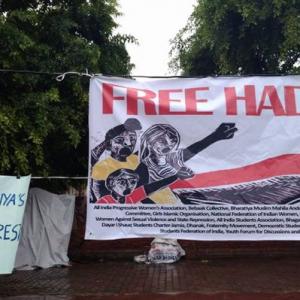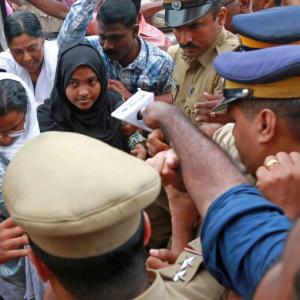The bench said that a court cannot interfere where there is free consent between the adults.
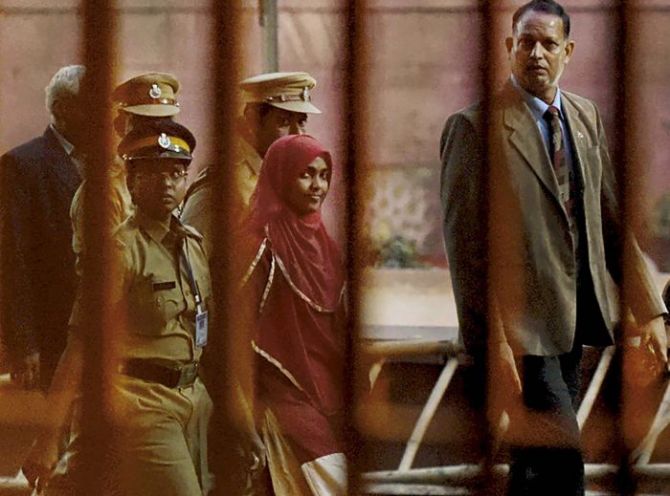
The Supreme Court on Thursday restored the marriage of Hadiya, a Hindu woman who had converted to Islam and entered into wedlock with a Muslim man, setting aside a Kerala high court order, and ruling that no court can interfere in the marriage of two consulting adults.
Pulling up the Kerala high court for annulling Hadiya's marriage to Shafin Jahan, the apex court observed that Article 226 gives the extraordinary power to high courts to protect the constitutional rights and not to scuttle them.
The high-profile case of alleged 'love jihad', a term used for Muslim men allegedly seducing and marrying Hindu women after making them convert to Islam, was being probed by anti-terror agency National Investigation Agency.
The court instructed the NIA to go ahead with its probe into alleged instances of love jihad without "touching the marriage".
In Kochi, Hadiya's father K M Asokan, who had claimed her daughter was "brainwashed" to convert, said he would consider moving a review petition in the Supreme Court against its judgement.
He maintained that his daughter's marriage with Shafin Jahan was an act of "adjustment" done by a group.
The bench of Chief Justice Dipak Misra said that the high court should not have annulled the marriage by its May 24 order last year in a habeas corpus petition filed by Asokan after his daughter had gone missing.
"We hold that the high court should not have annulled the marriage between appellant No.1, Shafin Jahan and respondent No.9, Hadiya alias Akhila Asokan, in a habeas corpus petition under Article 226 of the Constitution of India," the bench also comprising justices A M Khanwilkar and D Y Chandrachud said.
A habeas corpus petition is a writ petition requiring a person under arrest to be brought before a judge or to court for securing the person's release.
The Supreme Court said it had ordered personal presence of Hadiya on November 27 last year and she had admitted she married Jahan of her own free will.
"In view of the aforesaid, the appeal stands allowed. The judgement and order passed by the high court is set aside. Respondent No.9, Hadiya alias Akhila Asokan is at liberty to pursue her future endeavours according to law," it said.
The Kerala high court had on May 24 last year termed Hadiya's marriage a "sham" and annulled it, directing her to return to the custody of her Hindu parents.
However, when she told the apex court on November 27 that she wanted "freedom" to live with her husband, it had directed the 24-year-old to return to the homeopathy college she was studying in Salem in Tamil Nadu.
Senior advocate Kapil Sibal, appearing for Jahan, said as a matter of law no third party can interfere in the marriage between two consenting adults. He said marriage was a fundamental right.
Sibal contended that the Kerala high court had no jurisdiction to annul a marriage, which can be challenged only by the party to the marriage. He said no third party can interfere in it.
"The jurisdiction of marriage is not in the marriage of consenting adults and no investigating agency can interfere in the marriage. Even the father of girl can't interfere," Sibal argued.
Senior advocate Shyam Divan, appearing for Asokan, insisted the high court was right in annulling the marriage, and claimed it had inherent jurisdiction under Article 226 of Constitution.
To this, Justice Chandrachud said, "There has to be some exceptional circumstances which warrant court's interference in the marriage--like of a girl with a 65 year old man, out of poverty or illiteracy, where there was no free consent or the marriage should not have taken place in the first place."
Divan said the high court had found there was a well oiled machinery working to use the marriage of Hadiya as a guise to put the matter out of the court's reach.
Additional Solicitor General Maninder Singh, appearing for the NIA, said its investigation in the case was over and look out circulars have been issued against two people accused of promoting love jihad who were suspected to have gone out of the country.
"You (NIA) can carry out the investigation with regard to the offences but you cannot touch the marriage. Investigate anything but marriage," the bench said.
The apex court had in August last year asked the NIA to probe the case of conversion and marriage of Hadiya, after the agency claimed a "pattern" was emerging in Kerala with instances of alleged love jihad being reported.
The matter came to light when Hadiya's husband Shafin Jahan challenged the Kerala High Court order annulling his marriage and sending her to her parents' custody.

